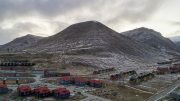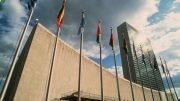Russia’s attack on Ukraine in February has been met with widespread condemnation in Europe and Norway.
Norway joined European sanctions against Russia (note: the sanctions entered into force in mid-March), openly condemning Moscow’s aggression and calling for an end to the war.
Prime Minister Jonas Gahr Støre’s government has decided to support Ukraine both in terms of funding and arms support, and Norwegians have donated more than NOK 700 million to Ukraine since the start of the war.
While the war continues to rage on, media and political commentators have been debating several important issues and potential consequences related to Norway’s role in the ongoing crisis.
Does sending financial and military aid to Ukraine make Norway a party to the war? What is the legal position of Norwegians who traveled to Ukraine to fight in the war? Questions such as these have become increasingly frequent as the crisis in Ukraine continues.
In order to get expert insight on some of these issues, Norway Today contacted Cecilie Hellestveit, a respected lawyer and researcher with a doctorate in international law of war from the Faculty of Law at the University of Oslo.
– – –
NT: Legally speaking, does sending financial and military aid to Ukraine make Norway a party to the war? Are there any potential legal consequences?
CH: No, it does not. Norway believes that Russia has invaded Ukraine in an act of unlawful aggression in violation of the UN Charter. Ukraine consequently has a legitimate right to self-defense. Norway is supporting Ukraine in this lawful effort by providing weapons in order for Ukraine to push back the unlawful aggression. It is a way of helping Ukraine to uphold international law on the use of force and the UN Charter.
However, for procedural reasons at the Security Council, there is no authoritative confirmation by the UN Security Council that the UN Charter has been violated. Russia can therefore claim that the rules of neutrality under the international law of use of force apply. Under these rules, there are certain limits to the sovereign protection for a country that provides military support to the adversary side in an ongoing armed conflict. These rules are expressed, among others, in the San Remo Manual on Naval Warfare (1995) and the Manual on Air and Missile Warfare (2009) and would allow for certain acts by Russia to halt Norwegian weapons aid to Ukraine.
However, NATO has stated that it will view any such infringement on the sovereignty of a NATO country as an attack under the NATO-alliance pact article 5. Hence, the military might of NATO is protecting Norway against such claims/acts by Russia.
NT: What is the legal position of Norwegians who traveled to Ukraine to fight in the war?
CH: Norwegians who travel to Ukraine will be citizens of a neutral state under the rules of humanitarian law. However, if they are enrolled in the Ukraine army, they will become combatants under the Geneva Conventions. If they are enrolled in militias or other non-state groups and take part in hostilities, they will not have the right to combatancy but will nevertheless be lawful targets for the Russian military for as long as they take part in hostilities.
If they are captured by the Russian forces, they may be tried for participation in the war. Hence, if they are not provided with combatant status, they may, for a good reason, fear captivity by Russian forces.
NT: The Organization for Security and Co-operation in Europe’s (OSCE) Office for Democratic Institutions and Human Rights recently found Russia violated international humanitarian law and committed human rights abuses when invading Ukraine. Can this report be used in future investigations relating to legal and political accountability in the war?
CH: The report is impressive in view of the fact that it was produced in the line of three weeks. It provides a very good starting point for a more thorough review of violations of international law committed by the warring parties in Ukraine, with an emphasis on the violations of international law committed by Russia – which, due to the nature of the invasion and the modus operandi of the Russian forces, is overwhelmingly more prevalent on the Russian side.
Yet, in line with the caveat expressed in the report, it is a preliminary finding. It is quite common that certain (aspects) of the findings of preliminary fact-finding missions such as this one are subsequently seen in a slightly different light by more thorough investigations. While some incidents may be added, other incidents may be discarded as breaches of international law due to additional knowledge about the circumstances at the time of the attack or murder. This mostly concerns the attacks in violations of the rules on the conduct of hostilities.
However, the report provides a very good initial overview of the most important types of violations, in addition to an outline of relevant applicable international law as the war stands today (although this may also change in the future).
NT: Your recent comments on the legal definition of genocide attracted a lot of attention in Norwegian media. Do you expect the relevant and competent courts (i.e., the International Court of Justice in The Hague) to reach a clear position on the war in Ukraine anytime soon? Based on previous experiences, could we be looking at years and years of proceedings?
CH: First, a word on genocide and the war in Ukraine. The OSCE-report also does not mention acts of genocidal character in its report. This is due to the absence, as of today, of acts in the war in Ukraine that would raise the guard of the fact finders (their mandate included all types of international crimes, including genocide).
However, this does not preclude the risk of such acts in the future. Most genocides of the last century have taken place well into wars, and the Russo-Ukrainian war is an extremely brutal war. There is also rhetoric surrounding the war effort and the objectives that could lead to such operations in the future.
With respect to the case in The Hague, this concerns the Russian allegation that an “ongoing genocide” was the reason why Russia was forced to escalate its war against Ukraine. It is a legal argument that Russia uses to avoid the application of the UN Charter (it is not a novel use of force but the escalation of an already existing conflict in Ukraine involving Russian forces).
Ukraine has brought this case before the ICJ in order to, first of all, have the court confirm that there was no ongoing genocide in Ukraine prior to February 24. It is highly likely that the ICJ will provide such confirmation to Ukraine.
Secondly, Ukraine invited the court to provide an injunction similar to the one it provided in the case against Myanmar in 2020, instructing the military in Myanmar to provide the court with a report every half a year on what measures the military was taking to prevent genocide. The ICJ gave an order on provisionary measures to Russia last month. The problem is that, unlike Myanmar, Russia is not fearing the conclusion of the ICJ in terms of concluding that Russian forces are committing genocide in Ukraine. Therefore, the court’s injunction does not have the same impact on Russia as it does on Myanmar.
These proceedings will probably take quite some time. It will probably not help Ukraine DURING the war. The value for Ukraine will be to strengthen the argument that the Russian invasion on February 24 was aggression and the ensuing war unlawful. This may have considerable effects in terms of reparation claims against Russia in the longer term. This is hence far more than an academic exercise.
But the reason why the Genocide Convention has been brought to bear is that all other avenues of international law to authoritatively confirm that Russia’s act on February 24 constituted aggression have been tried or are closed to Ukraine due to Russia’s position on the Security Council. The Genocide Convention gives jurisdiction to the ICJ in interpreting the Genocide Convention. Given that Russia has not accepted the compulsory jurisdiction of the ICJ but cannot object to it on this occasion because it follows from the Genocide Convention, this case is probably the best avenue for Ukraine to achieve the objective of having an international tribunal with authority refute the Russian argument for the invasion.
It does not mean that genocide is going on in Ukraine. It is part of a (clever) legal strategy on the part of Ukraine in order to corner Russia and strengthen the legal case of Ukraine that the war is unlawful aggression.
Robin-Ivan Capar is a contributor and editor at Norway Today.
Source: #Norway Today / #NorwayTodayNews
Do you have a news tip for Norway Today? We want to hear it. Get in touch at [email protected]




Cecilie presents the false, distorted official line with which our Western political leaders and “experts” like she are leading us and our families into nuclear holocaust – mass suicide.
NATO Article 5 collective defense was never meant to protect member states getting themselves into such a major war, which Norway’s weapons shipments to Ukraine have gotten us into. We are helping Ukrainians kill Russian soldiers. Objectively, we are right now very much in this war.
As to the UN Charter, we ourselves have repeatedly broken that against Russia’s friends like Yugoslavia/Serbia in 1999 – forced on the Serbs with Rambouillet Appendix B which Nobel Prize for Literature awardee Alexandr Solzhenitsyn himself decried – and Putin repeatedly refers to our Kosovo bombing war as justification for Russian counter-moves since – Iraq, Libya, and Syria.
Then there was our Western-backed Budapest peace agreement breaking 2014 Kiev coup/overthrow – violating the UN Charter – obviously not a legitimate popular “revolution” for the 4 reasons I have described previously on NT.
Russians especially of Putin’s generation have always feared another attack by the West, just like Jewish people fear another Holocaust, and World War 2 in the East was indeed a holocaust with 27 million men, women, and children victims dead, including Putin’s 2 year old brother Viktor whom he never knew and nearly his parents.
After seeing the West/NATO breaking our security promises to them and advancing on them, and – especially after Zelensky, pumped up by European leaders in Munich, intimated Ukraine would be open to getting nuclear weapons – the Russians see this as a war of self-defense … a “pre-emptive” war like we the West ourselves popularized with our (questionable) War On Terror.
By her misleading omission of these facts, Cecilie appears to be another of our Western experts who thinks we are “exceptional” and above respecting the UN Charter and international law ourselves.
And for 9 motives I have identified in my white paper published elsewhere, Joe Biden decisively opposed giving the Russians a fair peace and security treaty – “Prepare for impact!” he eagerly told a worried Zelensky – and clearly wanted this war and is at least as responsible as Putin for this otherwise entirely unnecessary tragedy.
And Norway has a special Peace Prize responsibility to instead try to stop war – to support a fair, permanent, peace and security treaty, especially after how we the West have broken the peace – not to feed this war with weapons.
It was always known Russia could not match NATO or a NATO-backed country, and Russia cannot lose this war. If we continue to feed this war with weapons, it will inevitably escalate into a NATO vs. Russia nuclear holocaust, for which our families – children – in Norway have been left criminally unprepared.
Regarding genocide, it is certainly getting there, on both sides. An Afghan-Ukrainian Lviv TV presenter – featuring an inset of Adolf Eichmann on the screen – was saying that ethnic Russian children should be exterminated. A Ukrainian doctor and hospital supervisor was talking about having Russian prisoners castrated. Both sides have been accusing the other of targeting their cultures and languages for suppression. And during Soviet times, Russians mocked/ridiculed and bullied Ukrainians just like Western Europeans always have done to Russians.
As to giving financial and humanitarian aid to Ukraine and giving non-criminal Ukrainian refugees sanctuary, that is commendable and by contrast in keeping with Norway’s ethical and humanitarian responsibility.
I do wish Kare Willoch and intelligence chief Kjell Grandhagen were still alive to give us their uniquely objective perspectives on what is happening, and I wish that moderate Senterpartei member Liv Signe Navarsete had not been bullied out of Parliament where she is now so desperately needed.
Actually, Cecilie and I have encountered each other before, during the Forsvars after-the-fact October 10-12 2016 seminar on the (il-)legality of Norway’s far less direct (but also indefensible) involvement in our Syrian war against Assad’s comparatively (for the Mideast) liberal government.
Cecilie was supposed to be the ethically finalizing/justifying wrap-up, but after she had made some categorial claim of how bad Assad was, I asked from the audience “What about the Saudis?!” … and I’ve wondered if she noticed Khashoggi’s grisly murder by them since.
Her expression was like I had hit her between the eyes with a brick – exactly like Gennadi Gerasimov’s back in Juneau in May 1986 after he had said the Soviets were all for direct on-site disarmament verification inspections, and I then asked during Qs&As WHAT ABOUT the Red Army’s unredressed murder of U.S. Army European security inspector Major Arthur Nicholson?
(He quibbled legalities like Cecilie has attempted here, but – realizing I had him and he was losing the audience – he got mad and seized on the English phrase that Nicholson was just in the wrong place at the wrong time.
People went into SHOCK. It was like STALIN had just walked into the hall.)